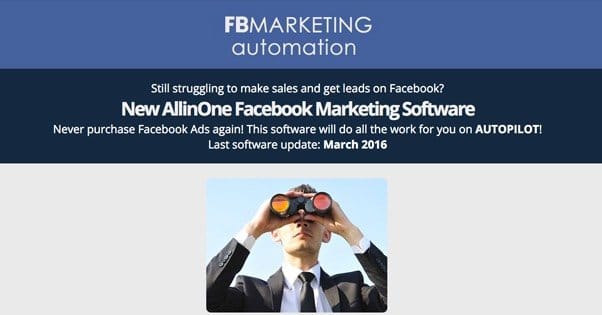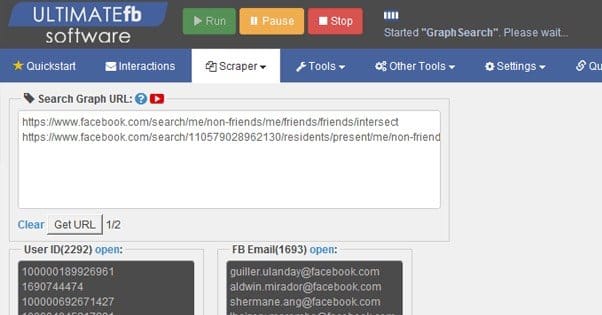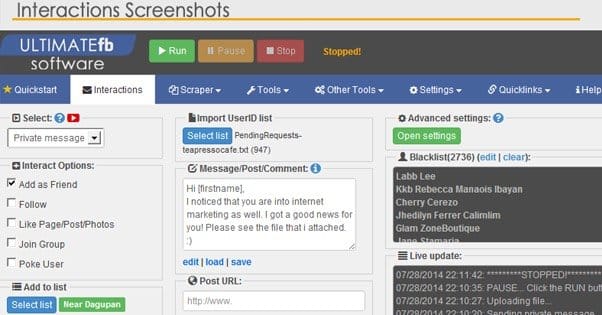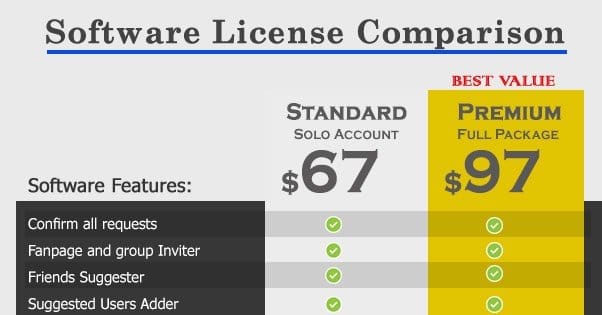 Written by ContentPowered.com
Written by ContentPowered.com
Marketers like automation when they can use it. Some marketers try to over-use it, and automate every aspect of their social presence. I don’t believe this is a good strategy – it typically backfires and forces you to start from scratch – but I can’t deny that it works for a select few people.
For these people, Facebook is a heck of a roadblock. It’s not like Twitter, which allows virtually anything, or a blog that can be totally automated from start to finish. Facebook puts heavy restrictions on usage, has a lot of bot detection in play, and throws captchas at anyone using so much as a proxy, let alone a rotating list for various accounts. On top of that, they need phone verification for many of the more crucial aspects of running a profile, and they’re quick to punish when something looks too far outside the norms.
As a result, finding a Facebook automation app is close to a holy grail for automation marketers. They search for a tool that can manage pages, profiles, and groups. They search for a tool that can save them the hassle of directly and manually setting up actions or forcing repetition. They want a tool capable of scraping useful data without harming their accounts.
Is Facebook Marketing GI that tool? Let’s find out.
What is Facebook Marketing GI and What Can it Do?
GI – as I’ll call it to simplify things moving forward – is a software automation bot. It allows you to scrape data, feed in information, and have your page managed according to your desires automatically. The idea is that, once you set it up, you never have to manually log in to Facebook to do things again.
The software pitches itself by asking you how much you’re spending on Facebook marketing, and how much less you can spend by using a tool to do things more effectively. For “just” $200 you can get a limited license to use the program, which will definitely probably save you money. It does this with a list of features like:
- The ability to scrape Facebook’s meta graph data to “find your target audience” through some unspecified means.
- Automated friend requests and follow suggestions with associated direct messages when a user accepts.
- Bulk invitations of existing audiences to like a current Facebook page, bypassing Facebook’s limits.
- Automated group search and joining without needing to actually look at what groups you’re joining.
- Automated group creation, invitations, and management features.
- The ability to direct sell your product on Facebook through groups and pages, as well as through private messages.
- Traffic driving features that refer people from Facebook to your website landing page.
- “Cheaper” Facebook ads, “cheaper” time and effort expended, and “make more money.”
If you squint, you might see the beginnings of an actual feature list in that list, but it’s hard to spot. What it’s basically saying is that it can scrape data from Facebook and allows you to use that data to automatically join groups, recommend pages, send messages, and post to all of the above.
GI promotes some more specific features, but I find it a little questionable how many of them are actually useful. For example, if you know anything about Facebook, tell me if you think any of these are legitimate marketing strategies as a business:
- Sending users private messages that bypass the spam filter and appear in the inbox regardless.
- Automatically send a greeting to your friends on their birthdays.
- Blacklist problematic users so they don’t show up as targets for your messages.
Sounds to me like the tools of a spammer. As a normal Facebook user, if a business pitch post showed up in my inbox, I’d be reporting the account that sent it. If a business started wishing me happy birthday, I’d wonder what the heck they were doing. Of course, this all doesn’t happen to me, because I’m not part of their target audience; I’m someone who actually knows something about how Facebook works.
Let’s keep looking at the features GI promotes for themselves, eh?
- “Emulate human interactions!” Sure guys, that sounds totally legitimate.
- Randomize private messages and posts with Spintax. You know, that janky article spinning software that always makes frankensteinian monstrosities out of perfectly good posts.
- Automatically like posts made by your friends. Regardless of context, of course; the software isn’t smart enough to know not to like a post about a tragedy.
- “Clickbait Poster.” Enough said. Okay, one more thing: Facebook hates clickbait and will hate you for using it.
- A captcha breaker, known tool of legitimate users everywhere.
- The ability to automatically remove posts in your group based on a keyword such as a website URL being posted over and over, as if by some automated system designed to post to groups. I call this one GI’s anti-GI feature.
- A photo album scraper that downloads the photos of a competitor to “use them for your own marketing.” Nevermind that you’d probably be violating copyright law in doing so.
- The ability to upload and manage literal hundreds of accounts at once.
GI has a lot of problems, and all of them stem from the fact that it is very much a black hat tool. It’s designed to take a social platform and remove anything social about it. It circumvents security, it breaks captchas, it spins content, and it spams inboxes. It’s pretty much just a giant pile of “things that make me report a Facebook page” all in software form.
As such, and you know this already, it’s incredibly popular with the subset of low-tier marketers who don’t know how to run a legitimate business and are forced to jump from tool to tool, blaming the tools when an account is banned rather than their own use of them. These are always the sorts of pages you see dead or abandoned on Facebook, or you get a handful of spam messages from before you see them disappear.
The main selling point of this program is primarily the automation, but it’s all out of date automation. Sure, the basic features still work, but who really pays attention to spun posts? Spintax isn’t sophisticated enough to make anything that sounds legitimate, it’s all obviously promotional and occasionally even barely functional English. Given that a lot of the people using this tool are ESL speakers to begin with, it just adds another layer of incomprehensibility to the whole thing.
It doesn’t help that the program is firmly represented in black hat circles. If you run a few Google searches, what are you going to find? A whole bunch of YouTube videos and tutorials, all of which have affiliate links attached. You’ll find a ton of copy-pasted – not even spun! – reviews of the program calling it a jackpot, posted on free blogs like “getmereviews2.wordpress.com” and so forth.
Incidentally, this showcases another common black hat marketing technique, the “false deal.” The actual GI website makes you want to believe you showed up at just the right time to get the program for $197 instead of the usual cost of $297, and that there’s a special deal right now where instead of 1 PC license, you actually get 4! So that’s like getting four copies of the software for $50 each, instead of having to pay $300 each! What a deal!
Except, of course, these reviews from literal years ago all talk about the same deals and the same prices. The software was never available as a 1-PC license and it was never available for $300, it’s always been $197 for 4. It’s all very transparent if you’ve paid any attention to marketing in the past.
Now, does Facebook Marketing GI have any redeeming features, or is it just ban-fodder for scamming low tier marketers out of their meager budgets?
I will say this; the Facebook graph scraper is actually pretty good. The ability to scrape the names and Facebook emails of everyone in a group or everyone who follows a particular page is surprisingly useful. You can put together potential target audiences that don’t rely on referential queries, and you can use that data elsewhere. It’s all pretty good for some basic data harvesting.
The thing is, there are other, cheaper scraping solutions out there, like Facebook ID Scraper. You don’t need to spend $200 on a piece of software you’re going to use 5% of.
Additionally, some of the automation tools are actually useful. Automatic accepting group applications is nice, though when you can set the group to open join it’s not really that valuable. It has some basic post scheduling, but every Facebook manager program this side of the sun has that.
My final verdict is something like this: Facebook Marketing GI is not a worthwhile investment. It has one minorly useful feature that’s difficult to find elsewhere, in the graph scraper. It has a lot of automation features that are useful, but are also available in every Facebook program that exists, from Social Oomph to HootSuite to IFTTT. It has a lot of black hat spinning and automation features that basically boil down to spam and I would rather see burn than see on my page.
Is Facebook Marketing GI a Scam?
So, this is a bit of a controversial question. I would cautiously say no, GI is not a scam, by the purest definition of a scam. When you send money to the company that makes the software, you do receive the software in return. It’s even maintained through Facebook changes, though I’m not sure if you actually get updates or not. You’re not having your money stolen directly.
On the other hand, the fact that GI promotes itself as this useful automation tool is a bit disingenuous. It does what it says it does, but that relies on the user failing to ask the most important question: do I want to do any of this? Do you want to be spamming inboxes of your users? No. Do you want to be posting spun content over and over? No. Do you want to be automatically and recklessly engaging with posts you don’t know the context of, and which may be negative? No. Do you want to be caught in the trap of wishing someone happy birthday when their birthday isn’t accurate and you should know? No.
Also, one of the features allows you to scrape the email addresses of Facebook users and send them bulk email messages. This is the literal exact definition of spam according to the Can-Spam Act passed in the United States in 2003. It is, in actual fact, illegal. If you’re reported, and if you’re prosecuted, you could be fined as much as $11,000 per email sent, and you might get jail time.
Now, I don’t anticipate that anyone has been prosecuted because of their use of Facebook Marketing GI, but it’s just one more thing you should know before you decide to go out and spend $200 on a piece of software you shouldn’t use.
I don’t like GI, because it encourages a lot of the behaviors that lead to perpetual spam, misuse of the platform, and damage to brands. The more spam people see on Facebook, the less they want to use it. That hurts everyone, not just you; every marketer on the site experiences lower reach, less engagement, higher ad costs, and less enthused users.
So, I guess, if your goal is to kill off Facebook, you and your million closest friends can all buy GI and set it to work undermining the value of the site. I’m sure the programmer responsible for the program would love a spare $197,000,000. It won’t help anyone in the long run, though. You’ll just have to move to a new marketing platform, buy the shady marketing tool for that one, and start the whole process over again.







